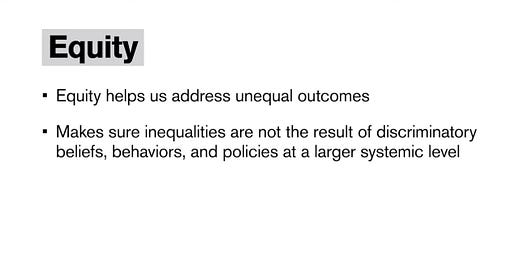In one of the ASU YouTube videos about DEI+B, we are taught about equity. The video tells us that equity, compared to equality, is about unequal outcomes. The concern is to show that inequalities (not inequities, shift in words there) are not the result of discrimination. If they are, we have laws in place that allow a person to pursue legal restitution.
However, as you look at the DEI system, you find that differences in outcomes are only explained as due to discrimination. Other possible explanations are not allowed. But why can’t we debate possible explanations?
For example, when differences in outcome are measured they are often taken across the board without important distinctions taken into account. Jordan Peterson is well known for documenting how this is done in studies about the gender pay gap. In any specific job it is illegal to pay a man more than a women (although in my case, a woman was paid more to do my same job). But men taken as a whole are said to make more and then it is implied this is due to discrimination. But it is really due to men and women making different free choices about the kinds of jobs they pursue. More dangerous jobs pay more. Women are free to pursue those same jobs.
In studying different outcomes, we need to ask: were all things the same before the different outcomes? What free choices ahead of time affected different outcomes? Is money the only or best way to study life outcomes? How do differing values affect different outcomes?
DEI explanations are not nuanced enough to ask these but fall into Marxist explanations. That means they reduce human society to class/race/gender conflict over material goods. This is a harmful way to understand human society and human life.
Parents, prospective students, and donors, do you want this material assumed in your classroom? Do you want to be able to question the assumptions behind this approach?




